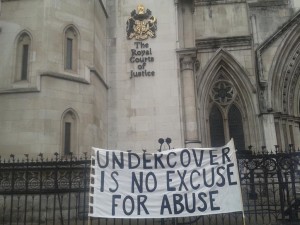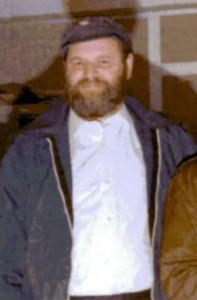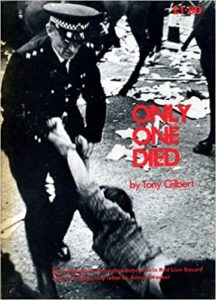UCPI Daily Report, 17 May 2022
Tranche 1, Phase 3, Day 7
17 May 2022
Witness:
Derek Brice
Statement from:
Anthony Greenslade

Today’s hearing of the Undercover Policing Inquiry saw only one live witness, Derek Brice (officer HN3378), who deserves a prize for most evasive answers in the Inquiry so far.
It also featured the publication of written evidence from Anthony Greenslade (officer HN2401) who was apparently brought in to boost “low morale” among the spycops of the Special Demonstration Squad.
Derek Brice (officer HN3378)
Brice was a Detective Inspector in the Special Demonstration Squad (SDS), from around May 1973 to October 1974.
Brice had been allocated an entire day as he is the only SDS manager of his era who is alive and in sufficient health to give evidence – or so it was thought. His tenure covered a number of important aspects – it is the period of the first known sexual relationships between undercover officers and people they spied on, the early use of dead children’s identities and the significant public order event that was the 1974 anti-fascist protest at Red Lion Square that resulted in the death of Kevin Gately.
A good 90% of the hearing was an exhausting litany of failures to remember anything, even the basics, interspersed with monosyllabic answers and claims that he had no awareness of stuff going on around him at the time.
After several years on Special Branch he was brought in as an officer with considerable expertise, although he had not been involved in any undercover work personally. He had served on the Bomb Squad, set up to investigate the Angry Brigade where he had been on the surveillance team – along with Greenslade. He continued to do work for the Bomb Squad after he was appointed to the SDS.

Conrad Dixon, founder of the SDS, 1968
However, the exact relationship between the SDS and the Bomb Squad is not clear, and Brice did not leave us any the wiser. He stated that Conrad Dixon had been a senior manager at the Bomb Squad yet claimed not to know that Dixon had set up the SDS, nor – being shown a handwritten organisational chart [MPS-0737402] – that both teams were being jointly supervised at that time.
Of his time at the SDS he said he was asked to join but not interviewed, that he never received any guidance from the then-head of the SDS, officer HN294 (1970-1973), on what the team was about or what his job entailed. As with the undercover officers, he said he learned on the job.
Describing his work as ‘welfare officer’ (or ‘quartermaster’ in his statement) he failed to explain what that entailed. Making sure the officers felt safe on the job, and had not reached the stage of having enough of it yet – that was about it.
CONVENIENT AMNESIAC
He claimed not to have known about the use of dead children’s birth certificates as the basis of the false identity adopted by undercovers. This stretches credulity, especially as many officers prepared their cover story while he was serving on the squad. Brice simply cant recall much discussion about this.
Among the many things he could not recall or was not aware of was the SDS’s relationship with C Squad, which monitored the left wing more generally. Nor was he aware of how information was transferred to A8 – the public order branch of the Met Police.
Things became slightly ridiculous when Brice said he was unaware of the close relationship with the Security Service (aka MI5). He was shown a document [MPS-0735753] which put him at a meeting with the Security Service, where the latter spoke about setting up a new department (F6) to also gather intelligence on left wing groups and subversion.
The SDS was asked for support, to share information and to help out if secret agents would get in conflict with the law. Brice had no recollection.
ANOTHER PUSH FOR ANSWERS
Despite the frustrating evidence, there were a few hints here and there which led to follow up questions at the end of the session, many put in by the other legal teams present.
There was a bit of exploration about officer HN294, now deceased, who Brice served under. HN294 is a key figure in the unit as it was in his time that many of the unit’s abuses first appear. Theway he appears to have run the unit and its relationship to the rest of Special Branch remains obscure and unexplained.
Brice let it slip that HN294’s successors were more approachable. It had also been noted that HN294 ran the SDS as his own ‘fiefdom’. Pressed on this, Brice admitted that that HN294 was “fairly dour” and “kept things to himself”. We are given an insight into a manager who kept to himself and apparently did not even visit the undercovers at their safehouse.
He had previously denied that two undercovers of the era, Rick Clark (‘Rick Gibson’, officer HN297) and ‘Jim Pickford‘ (officer HN300) were widely known as womanisers. Asked about whether such a reputation would have affected their selection for undercovers, Brice says he never thought about the risk of officers forming inappropriate relationships. He thought that (inadvertently) the practice of forming the relationships was lowered by recruiting married men.
However, when pressed over whether knowing that officers had a reputation as “womanisers” would have impacted on his own thinking regarding recommendation for being an undercover, he was unwilling to say it would have ruled them out.
RED LION SQUARE
The last question came directly from the Inquiry’s Chair, Sir John Mitting. He drew attention back to the events of Red Lion Square and summoned the 1974 SDS Annual Report [MPS-07930906] to point out the line:
“Fortunately, the SDS gave forewarning of both the size of the demonstration and the possible disorder which might occur.”

Only One Died by Tony Gilbert; the 1975 book critiquing the public inquiry into the killing of Kevin Gately
Red Lion Square was the biggest public order event of its era and the first death on a protest in decades. The Chair noted that Brice was the only senior SDS officer alive from the time and asked for help in understanding the claim in the Annual Report.
Brice’s position is that it was at the end of his time in the SDS (actually he still had four months to serve in the unit when Kevin Gately was killed) and, in line with the rest of the day, he said he couldn’t be of assistance as he barely remembered the event.
Mitting noted the Inquiry also can’t find any written evidence to back up the SDS’ claim – and wonders would the information have been communicated orally? Brice confirms that such information would have been committed in a written report.
With this mystery left unsolved, the day finally came to an end. As with the missing material around the anti-fascist demonstration in Southall and the death of Blair Peach five years later, the SDS seems to have made big claims but the evidence to support it’s reason for existing is remarkably lacking – a topic which the Inquiry and core participants on all sides will no doubt return to.
Witness statement of Derek Brice
Anthony Greenslade (officer HN2401)
The day also saw the publication of the written evidence of Anthony Greenslade (officer HN2401). He joined the police in the mid-1950s, and Special Branch in 1960.
He worked at Britain’s seaports, and after a spell in Anguilla, returned to London in 1970 to work in a section that was concerned with Black Power for around a year. He said Conrad Dixon wanted to get rid of him from the Black Power desk.
BOMB SQUAD & SDS ADMINISTRATOR
He was then posted to the Bomb Squad from 1971-74, and during this time had dealings with the SDS, in late 1973 (for six months) but did not at first consider himself a member of the unit.
At this time the Bomb Squad was conducting surveillance of the Angry Brigade; he worked alongside Brice (see below). He served the unit as a DI towards the end of 1973, working in an admin role. He helped the SDS by purchasing 12 cars for the undercovers to use and setting up second safe house for the spycops.
SDS RECRUITS – BOTTOM OF THE CLASS
It seems that the SDS ‘Class of 73’ had a problem with passing exams. as Greenslade was tasked with improving the spycops promotions exam record – he ran weekly classes for them at the safe house that lasted 3-4 hours. Only three of his six students passed these exams.
Interestingly, he states that low morale was a known issue in the SDS, and he was not the only officer brought in to help solve this problem.
‘KINGPIN’
He says people were recruited in a random way, at the time by HN294 who he describes as the unit’s ”kingpin”, running the unit as a “fiefdom”.
He says he wasn’t involved in choosing targets or the officers’ reporting, or any liaison with outside agencies like the Security Service.
He says he doesn’t know about many of the other key issues we’ve heard former officers being questioned about this week, such as the use of deceased children’s identities, sexual relationships with targets (which he thinks would have been unacceptable), or tradecraft. He knew nothing about the any ‘incidents’ in the SDS.
He said that personal details were routinely included in Special Branch reporting – there was nothing unusual about the material that the SDS were including in theirs.
Greenslade simply repeats that the SDS contribution to policing was that they provided advance warning in demonstrations, something that Roy Creamer brought into doubt yesterday.
He said:
“Information about trade unions would have been reported because of the effect of trade unions on the economy.”
About overtime, he noted that members of the SDS received fairly high overtime payments, and remembers that ‘Phil Cooper‘ (officer HN155) was the “highest paid” Detective Seargent in the Met at the time”. However, he doesn’t think this money affected the length of time they spent on the unit or their reporting.
Greenslade retired in 1987 at the rank of Chief Superintendent.
Probably the most interesting thing in Greenslade’s statement is his negative view of undercover policing:
“The only matter I want to add is that I wish to add if that I disagree fundamentally disagree with the principal of Undercover Policing, it was damaging to individuals many suffered from the work, and some left the police afterwards. I think some people are psychologically unsuited to that kind of work, as I am.”
Witness statement of Anthony Greenslade
Transcript and video of the morning and afternoon the day’s hearing
The current round of Undercover Policing Inquiry hearings, focusing on Special Demonstration Squad managers 1968-82, continue until Friday 20 May.
